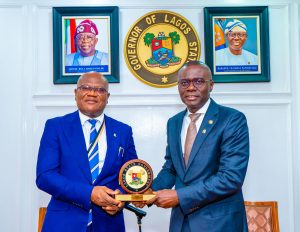FG appoints 23 managers to lead $10bn Global Investment Fund
4 min read
The National Bureau of Statistics (NBS) latest report revealing a 3.19% GDP growth for Nigeria in the second quarter of 2024 has faced significant criticism from the Manufacturers Association of Nigeria (MAN) and the SME wing of Lagos Chamber of Commerce and Industry (LCCI), Daily Sun reports.
Daily Sun said that while the NBS figures suggested a robust expansion in the economy, both MAN and LCCI argue that the growth is not being reflected in the experiences of manufacturers and the broader Nigerian populace.
MAN expressed worry that the reported growth fails to capture the true challenges confronting the manufacturing sector. Issues such as soaring production costs, insufficient infrastructure and persistent supply chain disruptions continue to hinder manufacturers, preventing them from reaping the benefits of economic progress.
The repercussions of that also reflect on the continuous hike in prices of goods and services borne by consumers.
In a telephone chat with Daily Sun, former chairman, Manufacturers Association of Nigeria (MAN), Apapa branch, Frank Onyebu, noted that based on the reality on ground, there was no indication that the GDP increased or grew by 3.19 percent.
“From all indices, no sector is growing. They should indicate the sectors that are growing right now. The industrial sector is not growing. I don’t know if the agricultural sector is growing. It’s difficult to really come to terms with the reality of what is happening. And with the figure of 3.19 percent, it’s difficult for anybody to actually agree to that. I don’t see any sector growing right now”, he said.
On the IMF prediction of five percent GDP growth this year, Onyebu said it was quite doubtful considering the way the country was being managed at the moment.
“We are getting ready for the end of the year. Things have never been so bad in this country. I don’t know how they did their calculations, I seriously have my doubts.
“Things are not going well. I’m in the manufacturing sector, a lot of companies are shutting down, the inflation rate is so high.
“If the agriculture sector is growing at least the food inflation will not be high. The cost of food and other items are still very high. These figures are not convincing”, he explained.
READ ALSO: https://newsstrike.com.ng/2024/08/28/lagos-state-judiciary-releases-plan-for-new-legal-year/
The LCCI echoed similar sentiments, questioning the practical impact of the growth figures on ordinary Nigerians. Despite the positive growth report, many businesses are still grappling with inflation, fluctuating exchange rates, and other economic hardships that affect consumer spending and overall economic well-being.
Daniel Dickson-Okezie, chairman SMEs Group, LCCI insisted that the growth reported by the NBS has yet to translate into tangible benefits for the general population or for those operating within the commercial sector.
“Well, it’s possible that it did but the question is how real? It is obvious that the economy is not making progress and no Nigerian can say that they are feeling the impact of any growth in terms of the GDP growth.
“To us Nigerians, there was a time when Nigerians liked to hear about the GDP growth or rather pay attention to the issue of growth or decline in the GDP, but not anymore. Nigerians today are thinking of food, energy, security. So, these are what an average Nigerian is thinking about. With these three issues not addressed, nobody has interest in the GDP”, he said.
YOU MAY ALSO LIKE: https://newsstrike.com.ng/2024/08/28/again-nollywood-loses-yusuf-olorungbebe/
Both organisations are calling for a more nuanced examination of the GDP data and its implications. They advocate for policies that address the specific needs of various economic sectors to ensure that growth translates into real, meaningful improvements in business conditions and the standard of living for Nigerians.
Meanwhile, the International Monetary Fund (IMF) has projected that Nigeria’s economy could achieve a 5 per cent GDP growth rate if key structural reforms are implemented, positioning the country as a more attractive destination for global investors.
Speaking during the 2024 International Business Conference organised by the Lagos Chamber of Commerce and Industry (LCCI) in Lagos on Tuesday, IMF’s Resident Representative, Christian Ebeke noted that Nigeria’s economy, which is currently growing at about 3 per cent, has the potential to accelerate to 5 per cent growth if the government focused on reducing structural inefficiencies by at least 25 per cent particularly in governance and business regulations.
According to him, “If Nigeria were to close the gaps in governance and bring its business regulations in line with other emerging markets, we could see a substantial increase in growth,” he stated. Ebeke emphasized that improving the efficiency of these sectors could add an additional 2 per cent to the country’s GDP, effectively boosting it to 5 per cent.
These reforms, he noted, were crucial for Nigeria to compete on a global scale with other large economies such as India and China. “We strongly believe that Nigeria has the potential to be a major player in the global economy, but this requires significant and sustained efforts in reforming key sectors,” he added.




